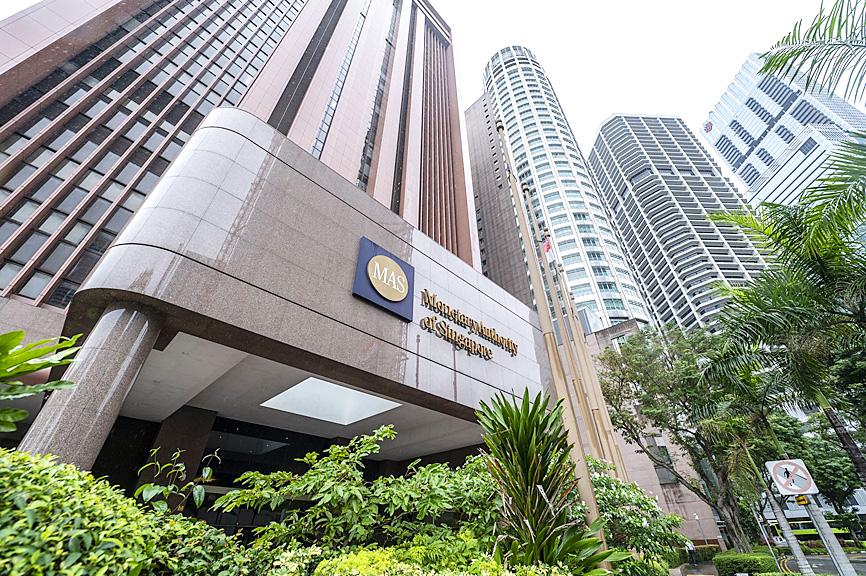The Monetary Authority of Singapore yesterday proposed a slate of environmental, social and governance (ESG) regulations for financial institutions and listed companies, demonstrating the goal to align with emerging international standards, and to accommodate Asian countries’ persistent need for financing in heavy-emitting and fossil fuel industries.
The central bank and Singapore Exchange Ltd are planning to require key financial institutions and listed companies to make ESG disclosures in line with rules being developed by the International Sustainability Standards Board (ISSB), Singaporean Deputy Prime Minister Lawrence Wong (黃循財) said.
The ISSB rules, established by the London-based International Financial Reporting Standards Foundation as a complement to its International Accounting Standards Board, are becoming a common template for Asian regulators.

Photo: Bloomberg
Hong Kong this month said it would mandate companies listed on its stock exchange to make climate disclosures based off the ISSB framework. China, which is considering making disclosures mandatory, has allowed the foundation to open a Beijing office to promote ISSB standards there.
At the same time, Singapore is introducing a raft of measures to encourage transition finance in Asia.
The central bank’s sustainable debt grant schemes would include bonds and loans designed to assist heavy industries such as steel and cement in becoming more energy efficient and shrink their greenhouse gas emissions.
In Europe, which has been the global leader on green finance and ESG regulation, transition instruments are often viewed with skepticism. Banks that finance carbon-intensive industries have to account for those emissions in their disclosures, and proponents of aggressive action on climate change say that transition funding lets polluters off the hook.
Asian countries and regulators have pushed back, saying that the transition away from fossil fuels would be very expensive — and is largely a solution to a problem for which they bear little historical responsibility.
“No amount of new green projects will get us to net zero,” Wong said. “We need to resolve everything that’s existing today and especially in Asia, where 60 percent of the electricity is generated by coal plants. So how do we bring about a more orderly and responsible phasing out of coal plants in Asia, while safeguarding the lives and livelihoods of people in this region.”
The central bank is also working with the International Energy Agency to develop decarbonization pathways for emissions-heavy sectors in the region.
Wong said such pathways would help financial institutions “reference these pathways when they set emissions reduction targets, and when they engage with their clients on initiatives to decarbonize their businesses.”
Wong said that Singapore would work to increase blended finance for phasing out coal-fired power plants and other transition activities.
Southeast Asian states last month released an updated version of a taxonomy that included the phasing out of coal assets.
The central bank is also developing a code of conduct for firms like MSCI Inc and S&P Global Inc that provide ESG ratings and data, and wants them to disclose how transition risks are factored into their products.

Taiwan Semiconductor Manufacturing Co (TSMC, 台積電) yesterday said that its investment plan in Arizona is going according to schedule, following a local media report claiming that the company is planning to break ground on its third wafer fab in the US in June. In a statement, TSMC said it does not comment on market speculation, but that its investments in Arizona are proceeding well. TSMC is investing more than US$65 billion in Arizona to build three advanced wafer fabs. The first one has started production using the 4-nanometer (nm) process, while the second one would start mass production using the

‘SILVER LINING’: Although the news caused TSMC to fall on the local market, an analyst said that as tariffs are not set to go into effect until April, there is still time for negotiations US President Donald Trump on Tuesday said that he would likely impose tariffs on semiconductor, automobile and pharmaceutical imports of about 25 percent, with an announcement coming as soon as April 2 in a move that would represent a dramatic widening of the US leader’s trade war. “I probably will tell you that on April 2, but it’ll be in the neighborhood of 25 percent,” Trump told reporters at his Mar-a-Lago club when asked about his plan for auto tariffs. Asked about similar levies on pharmaceutical drugs and semiconductors, the president said that “it’ll be 25 percent and higher, and it’ll

CHIP BOOM: Revenue for the semiconductor industry is set to reach US$1 trillion by 2032, opening up opportunities for the chip pacakging and testing company, it said ASE Technology Holding Co (日月光投控), the world’s largest provider of outsourced semiconductor assembly and test (OSAT) services, yesterday launched a new advanced manufacturing facility in Penang, Malaysia, aiming to meet growing demand for emerging technologies such as generative artificial intelligence (AI) applications. The US$300 million facility is a critical step in expanding ASE’s global footprint, offering an alternative for customers from the US, Europe, Japan, South Korea and China to assemble and test chips outside of Taiwan amid efforts to diversify supply chains. The plant, the company’s fifth in Malaysia, is part of a strategic expansion plan that would more than triple

Taiwanese artificial intelligence (AI) server makers are expected to make major investments in Texas in May after US President Donald Trump’s first 100 days in office and amid his rising tariff threats, Taiwan Electrical and Electronic Manufacturers’ Association (TEEMA, 台灣電子電機公會) chairman Richard Lee (李詩欽) said yesterday. The association led a delegation of seven AI server manufacturers to Washington, as well as the US states of California, Texas and New Mexico, to discuss land and tax issues, as Taiwanese firms speed up their production plans in the US with many of them seeing Texas as their top option for investment, Lee said. The